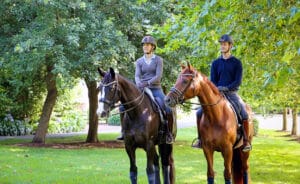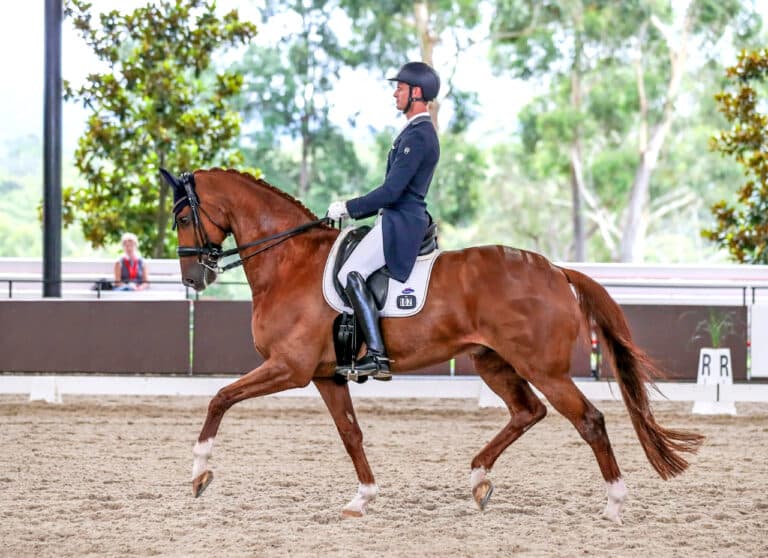David and Robbie McKinnon own and operate McKinnon Sport Horses, a boutique training and teaching facility in the beautiful NSW Southern Highlands.
Q: Do your parents ride?
A: No, I don’t come from a horsey family. I was born with a love of horses and as a child slowly convinced my parents to buy me a pony – and it went from there.
Q: What led you into working full time with horses?
A: After school I worked for Mark Dowling at Centennial Vineyards. I was studying horticulture and riding some of his horses. I had a few lessons on Mark’s horses with Brett Parbery who offered me a job to ride and groom for him. After a few years with Brett, my wife Robbie and I started a business together – McKinnon Sport Horses – the rest is history.
Q: In the early days were you attracted to other equestrian sports or disciplines? A: Before I knew what dressage was I was riding at home around the paddocks and over trees which I made into jumps. I often rode without a saddle or bridle. One day at Pony Club I rode a dressage test and the club’s instructor told me I could be good at it. That was it. From then on I put all the time and effort into dressage.
Q: In those formative years who were your trainers/mentors?
A: Sarah Venamore, Mark Dowling, Brett Parbery and Sue Hearn.
Q: What was your earliest major dressage success?
A: Riding the Healey family’s Bradgate Park Jatzz – a big brown gelding by Jazz. I competed him as Brett was unable to. He was elementary champion at the state championships. It doesn’t sound really amazing, but at that time it was like my being at the Olympics! It was about eleven years ago I think.

David and Robbie at home (Image by SWD Images).
Q: Robbie is an exceptionally successful equestrian competing at top level dressage and as a show rider. How did you meet?
A: At an Equestrian Australia awards night in Sydney in 2007. It was a bit of a set up from a mutual friend
Q: Do you happily train together?
A: We ride and train together on most days. It works very well most of the time although we do have the occasional disagreement about things, but we don’t hold a grudge and are usually over it by the afternoon.
Q: Where are you now based and do you have staff?
A: At Centennial Vineyards on the outskirts of Bowral in the Southern Highlands which is just over an hour from Sydney and an hour and a half from Canberra. We rent some amazing facilities which include indoor and outdoor arenas, two stable blocks, an apartment, and horse paddocks which back onto five hundred acres of National Park with great trails. And we have a good team who help us every day with the care of our horses.
Q: Describe an average working day for the McKinnons.
A: It begins at 5:30am. I sit in the office and deal with paperwork and Robbie organises the riding list and the daily plan for the team to follow. They feed up at 6:30, turn out the horses into the paddocks and do the morning chores while Robbie and I go to the gym. We ride from 8:00am through to 3:00pm, then we coach until 6:00 in the evening. Afterwards we eat dinner, do the night hay and feed at 9:00 and are in bed by 10:30. Then do it all again!

At Willinga Park Dressage by the Sea
Q: Who does the cooking?
A: We share it but Robbie is far better than me!
Q: How many horses are you working at present?
A: We ride eight or nine daily. Some belong to our wonderful owners and we own four of the ridden horses.
Q: What’s the most important thing to look for in a good dressage horse?
A: When looking at a horse for us the most important trait is a willingness to work and then good basic paces and conformation.
Q: Who’s helping with your dressage training these days?
A: My wife (when we’re not arguing) and I have regular online lessons with Lyndal Oatley and Patrik Kittel.
Q: You’ve travelled overseas to ride with internationals. Where did you go and what are some of the major things you learnt?
A: I went to Germany to train with Kittel and Oatley. I learned attention to detail on the basics and the importance of praising the horses and really making it fun for them.
Q: What’s your advice to young competitors here who want to compete on the European circuit?
A: I think it’s really important for our young riders to travel overseas. Before I rode there I thought I was pretty great! Then when you’re there you realise it’s another whole level compared to Australia. However, I do think they should first spend some time in a professional barn here so they don’t get too much of a shock!
Q: Past or present, who do you really admire as a rider and why?
A: I have to say Patrik Kittel. His ability to get the horses to work so they’re really expressive but still so relaxed is pretty amazing.
Q: Do you suffer from competition nerves?
A: Yes, but I really try to stick to a plan for warming up and doing the test and that helps.
Q: Do you have any superstitions?
A: No, I’m more OCD. I’m very fussy about how everything is with the horse at a competition from the gear to feeding to bedding and everything in between.
Q: What’s the worst thing that’s ever happened to you when competing?
A: Definitely having food poisoning while competing and, yes, exactly what you are imagining!
Q: Do you have other interests?
A: My other obsession is the ocean, fishing in particular.
Extra Q&As
Q: What are the best and worst things about being with horses?
A: The best thing is working outside with animals all day. The worst thing is when they are sick.
Q: When giving clinics, do you find there are mistakes which most of your pupils tend to make?
A: It has to be kicking all the time with no reaction.
Q: What would you say to a youngster wanting full time involvement with horses?
A: Here’s my number.
Q: Of all the dressage horses around the world, past and present, which would you like to have owned/ridden?
A: I would have loved Valegro to be in our stables.
Q: If dressage was no longer an option what other riding would you do?
A: I’d definitely go show jumping.
Feature Image: David and Forlan competing in the Willinga Park CDI (Image by Amy Sue Alston).



